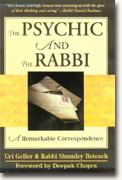The Psychic & the Rabbi
Uri Geller &
Rabbi Shmuley Boteach
book reviews:
· general fiction
· chick lit/romance
· sci-fi/fantasy
· graphic novels
· nonfiction
· audio books
· author interviews
· children's books @
curledupkids.com
· DVD reviews @
curledupdvd.com
newsletter
win books
buy online
links
home
for authors
& publishers
for reviewers

 |
The Psychic and the Rabbi: A Remarkable Correspondence Uri Geller & Rabbi Shmuley Boteach Sourcebooks Trade Hardcover 224 pages April 2001 |
|
Rabbi Boteach willingly accepts the challenge to reframe and interpret Uri's questions about war, random killings, and the medically botched birth and death of his son. The Rabbi responds with content from Jewish traditions, scriptures, and stories of Moses, Abraham, and his own father figure, mentor, and humble guide, Rabbi Lubavitcher Rebbe. Geller, a secular Jew and nonbeliever of Judaism, is in search of fame, recognition, unique celebrity status, and personal identity. He describes an adoration of John Lennon and Elvis Presley and enthusiastically supported mutual beliefs in mysticism, supernatural forces, alien intelligence and interventions on this planet. Uri had a different response to celebrity street magician David Blaine, especially his skepticism and dogged curiosity about Geller's bending metals. Rabbi Boteach presents himself as establishment, structured, yet open to guilt-free avenues to material success, fame, and "goodness" in the world while trying to stay on the "halakha" (the whole body of Jewish religious laws and customs) or path to God. As one might expect, the Rabbi has strong, absolute interpretations of biblical works and comparable opinions about one God, the personal/societal functions of formal religion, parenting, marriage, and counseling. His views on human psychology, specifically the importance of individual dignity, self-worth, purpose, and depression appear to be on target. His argument for a collective awareness of finer distinctions for loving God more than religion, religious identification, divisiveness, and the idolization of symbols as objects seemed tortuous to follow and difficult to digest. Rabbi Boteach admits he wants to go beyond merely feeling spiritual: "I want to know I am connecting with God," a connection with a "true cosmic consciousness" without going off the deep end. The authors do not address directly the "deep end" or the historical context of extreme religious, political, social conflicts, suicides, and killings in the Middle East. The Psychic and the Rabbi brings two Jewish men together as friends into a special relationship. Both came from broken homes without strong, consistent, stable fathers or protective older brothers. They find strengths in each other by disclosing and sharing more of their inner, but not completely integrated, daily wants, concerns, feelings, hopes, and perspectives on self, family, religion and the world. Some content may have been accepted, discussed, and interpreted in ways that gave each more balance or clarity of self-definition and purpose in otherwise topsy-turvy, celebrity-oriented careers. One wonders if the same kind of experience and relationship can happen across as well as within religious and societal boundaries in today's turbulent world. © 2002 by David L. Johnson, Ph.D., for Curled Up With a Good Book |
| Also by Rabbi Shmuley Boteach: |
|
|
|
 Click here to learn more about this month's sponsor! |
|
| fiction · sf/f · comic books · nonfiction · audio newsletter · free book contest · buy books online review index · links · · authors & publishers reviewers |
|
| site by ELBO Computing Resources, Inc. | |
 The book consists of 20 long, formal letters. Rabbi Boteach writes from a more dominant, father-figure position. He teaches, mentors, supports, interprets, and, at times, consoles Geller who writes from a more impressionable, childlike, imaginative, and often tormented position. Consequently, the Rabbi's letters generate about 179 pages, or roughly 90 more pages than Geller's output, in a loose chronological order. Also, the authors had considerable telephone contact and communication between them before and after each letter and before publication of the final work. At times, Rabbi Boteach goes far out to equate mankind's "hope for tomorrow" with Geller's bending metals by "will power." Geller wants his audience to see him as anti-establishment, a rebellious secular Jew, against science and conventional norms; thus, he is free to say and do what others may not be able to do. He wants the Rabbi (and readers) to try and listen to his questions and find the hidden questions inside. Geller admits to having talked with psychiatrists and psychologists about these issues without accepting their interpretations.
The book consists of 20 long, formal letters. Rabbi Boteach writes from a more dominant, father-figure position. He teaches, mentors, supports, interprets, and, at times, consoles Geller who writes from a more impressionable, childlike, imaginative, and often tormented position. Consequently, the Rabbi's letters generate about 179 pages, or roughly 90 more pages than Geller's output, in a loose chronological order. Also, the authors had considerable telephone contact and communication between them before and after each letter and before publication of the final work. At times, Rabbi Boteach goes far out to equate mankind's "hope for tomorrow" with Geller's bending metals by "will power." Geller wants his audience to see him as anti-establishment, a rebellious secular Jew, against science and conventional norms; thus, he is free to say and do what others may not be able to do. He wants the Rabbi (and readers) to try and listen to his questions and find the hidden questions inside. Geller admits to having talked with psychiatrists and psychologists about these issues without accepting their interpretations.